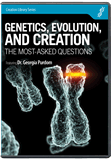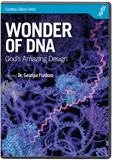
DNA Prevents Reproducing Between Two Species
ScienceDaily: “Junk DNA Mechanism that Prevents Two Species from Reproducing Discovered” Has the U.S. government finally supported creationist research? Alas, no, but the results of a National Institutes of Health study fit squarely within the young-earth creation framework.
Researchers at Cornell University report in PLoS Biology the results of a genetic examination of fruit flies (“Species-Specific Heterochromatin Prevents Mitotic Chromosome Segregation to Cause Hybrid Lethality in Drosophila”). The scientists learned that “junk” DNA can be responsible for rendering two otherwise closely related species unable to interbreed.
“Junk” DNA can be responsible for rendering two otherwise closely related species unable to interbreed.
The team examined cross-breeds between the closely related fruit flies Drosophila melanogaster and D. simulans. The flies are closely related, and male D. melanogaster can breed with female D. simulans to produce viable male offspring. Female offspring of such a cross, however, die as embryos. The question is, why? Lead author Patrick Ferree calls it an “unsolved problem,” elaborating, “What are the elements that are killing these female hybrids and how are they doing that?”
By looking more closely at the genetic composition of the D. melanogaster x D. simulans embryos, the scientists found a specific DNA segment that appears only in the father fly’s X chromosome and that leads to embryo death. Because only female offspring receive an X chromosome from their father (males receive a Y chromosome), only the female cross-breeds die.
The location of the fatal DNA segment was in the male X chromosome’s heterochromatin, a region full of what is sometimes called “junk” DNA. The segment halts the initial divisions of the embryo by preventing the male X chromosome from separating as it should. The researchers believe the cellular machinery from the mother no longer “recognizes” the heterochromatin of the father’s. In fact, the part of the paternal X chromosome believed to be causing the trouble has some five million DNA base pairs, compared to only 100,000 in the equivalent portion from the mother.
The researchers believe such problems may cause reproductive incompatibility in other similar species. Cornell’s Patrick Ferree explained, “[The study] points to a species-specific difference in heterochromatin between these two species. This could explain other instances when you have female hybrid lethality.”
The species on earth today descend from the original created kinds of Genesis 1. The many inter-species breedings that are possible today (e.g., zonkeys, wholphins), as well as the close similarities within biological groups (e.g., the canine group) that are distinct from one another, remind us of this fact. But exactly why the created kinds have fractured into many incompatible species has only been answered indirectly by creationists, who point to the speciating effects of genetics and geography. By investigating a case of mixed-success cross-breeding, the scientists at Cornell have given us greater insight into how genetic differences have contributed to the further division of the created kinds.
For more information
Remember, if you see a news story that might merit some attention, let us know about it! (Note: if the story originates from the Associated Press, Fox News, MSNBC, the New York Times, or another major national media outlet, we will most likely have already heard about it.) And thanks to all of our readers who have submitted great news tips to us.
(Please note that links will take you directly to the source. Answers in Genesis is not responsible for content on the websites to which we refer. For more information, please see our Privacy Policy.)
Recommended Resources

Answers in Genesis is an apologetics ministry, dedicated to helping Christians defend their faith and proclaim the good news of Jesus Christ.
- Customer Service 800.778.3390
- © 2024 Answers in Genesis




